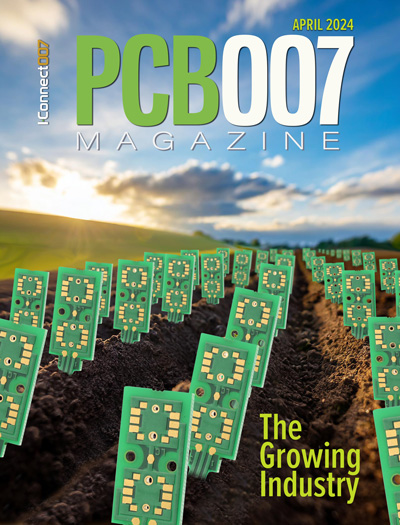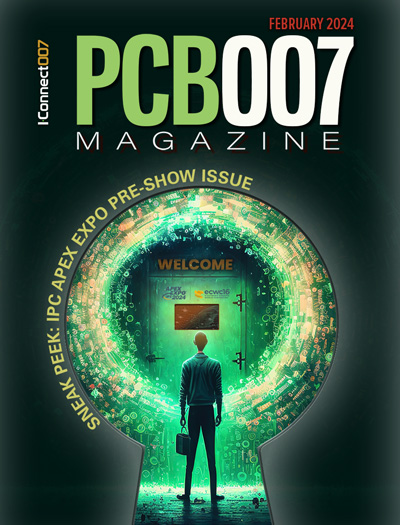-

- News
- Books
Featured Books
- pcb007 Magazine
Latest Issues
Current Issue
The Growing Industry
In this issue of PCB007 Magazine, we talk with leading economic experts, advocacy specialists in Washington, D.C., and PCB company leadership to get a well-rounded picture of what’s happening in the industry today. Don’t miss it.

The Sustainability Issue
Sustainability is one of the most widely used terms in business today, especially for electronics and manufacturing but what does it mean to you? We explore the environmental, business, and economic impacts.

The Fabricator’s Guide to IPC APEX EXPO
This issue previews many of the important events taking place at this year's show and highlights some changes and opportunities. So, buckle up. We are counting down to IPC APEX EXPO 2024.
- Articles
Article Highlights
- Columns
Search Console
- Links
- Events
||| MENU - pcb007 Magazine
APCT Moves into Rigid-Flex with Cartel, Cirtech Acquisition
June 18, 2018 | Andy ShaughnessyEstimated reading time: 4 minutes
When I spoke with APCT President Steve Robinson a year ago, he said he was interested in adding flex and rigid-flex capabilities, and working closely with designers and engineers. With the recent acquisition of Cartel and their subsidiary Cirtech, APCT now has a flex and rigid-flex facility, along with military and aerospace certifications. At DesignCon 2018, I asked Steve to discuss these acquisitions and what they mean for APCT and their customers.
Andy Shaughnessy: Steve, good to see you again. Now, as the top guy at APCT…
Steve Robinson: I’m the head janitor. I clean up all the messes [laughs].
Shaughnessy: That’s right. Steve, give us a quick background on APCT.
Robinson: APCT was founded in 2008. It was Advanced Printed Circuits before that. This will be the 37th year of that facility and that operation. When I left Merix, I acquired this operation and we’ve been focusing on a high level of advanced technology and high engineering support for over eight years now. Business has been great, and we’ve been very fortunate. I think we picked the right market segment and the right business model that we gleaned at the time. We just had a nice start to 2018 with another acquisition.
Shaughnessy: Tell us about this acquisition.
Robinson: We acquired two business entities. First, Cartel Electronics, run by Bruce McMaster in Orange County, California is a rigid medium-to-advanced technology manufacturer, a high-mix commercial factory. Then we acquired an affiliate of theirs, Cirtech, which has a market niche: defense aerospace, military-focused, with high-level certification, and flex and rigid-flex as well. One of my charters in 2017 was to provide a solution for our customers in the flex and rigid-flex arena. And I was happy to get this deal done; we started on it in August 2017 and finally closed in January 2018. It’s nice to have the additional capacity and depth from the Cartel team, along with the additional offering of the flex and rigid-flex. The defense and aerospace certifications of Mil-P-55110 and 31032 were high-value targets, and to be honest, it was easier to acquire than it was to implement them in my current operations. So, we chose that path.
Shaughnessy: So you don’t have to train anyone...
Robinson: Yes, you don’t have to change the culture of your specific factories either. One is a high-reliability facility, a little bit more meticulous with its focus, while the other facilities are more advanced technology-focused and speed-focused. Stopping to complete 20 pages of paperwork every other day is kind of cumbersome to our task of quick turn, but both strive for high reliability.
And I’m really excited to introduce our quick-turn culture into those arenas. In the initial month, I’ve been meeting with customers, especially the flex and rigid-flex. Even in the defense and aerospace segments, the technologies are evolving very quickly, and there’s a shortage of suppliers. So when you have our established, high-reliability factory and now you introduce our advanced technology, quickturn capabilities, our meetings have been pretty eye-opening. Customers now know that they have a source that they can go to that offers a broader range of technology for them. Because they’re being pressured, the defense industry is the same as ours—smaller, thinner, lighter, faster, more economical, more affordable, and more efficient. And so that’s driving smaller, tighter lines, smaller features, everything that embraces the advanced technology space that APCT has niched itself in.
So far the feedback’s been tremendous, and the customer interest is through the roof compared to what we expected. So it’s really good. We’re really excited about it, looking forward to the rest of 2018 and working with it. As I said before, as with any acquisition, you don’t buy a company; you buy the team. I’m excited about the depth of the team, and the experience they have. Many of these people have been building printed circuit boards in their industry niche for 20–30 years, so it adds tremendous depth to APCT. It still is just people working with people, so to have a huge surplus of industry veterans is something special.
Bruce McMaster has been one of the top leaders of our industry for years, since the DDI days. John Stein is running our Cirtech operations, and he has many years in the design and manufacturing of flex and rigid-flex. I thought my team was the strongest team in the industry prior to this, so it’s really exciting for me. As CEO, my job is team building, right? I put the best players on the field and have a good game strategy, and then execute with a good team. I am about to roll the PCB Patriots into the circuit board industry.
To read the full version of this interview which appeared in the April 2018 issue of FLEX007 Magazine, click here.
Suggested Items
KIC’s Miles Moreau to Present Profiling Basics and Best Practices at SMTA Wisconsin Chapter PCBA Profile Workshop
01/25/2024 | KICKIC, a renowned pioneer in thermal process and temperature measurement solutions for electronics manufacturing, announces that Miles Moreau, General Manager, will be a featured speaker at the SMTA Wisconsin Chapter In-Person PCBA Profile Workshop.
The Drive Toward UHDI and Substrates
09/20/2023 | I-Connect007 Editorial TeamPanasonic’s Darren Hitchcock spoke with the I-Connect007 Editorial Team on the complexities of moving toward ultra HDI manufacturing. As we learn in this conversation, the number of shifting constraints relative to traditional PCB fabrication is quite large and can sometimes conflict with each other.
Standard Of Excellence: The Products of the Future
09/19/2023 | Anaya Vardya -- Column: Standard of ExcellenceIn my last column, I discussed cutting-edge innovations in printed circuit board technology, focusing on innovative trends in ultra HDI, embedded passives and components, green PCBs, and advanced substrate materials. This month, I’m following up with the products these new PCB technologies are destined for. Why do we need all these new technologies?
Experience ViTrox's State-of-the-Art Offerings at SMTA Guadalajara 2023 Presented by Sales Channel Partner—SMTo Engineering
09/18/2023 | ViTroxViTrox, which aims to be the world’s most trusted technology company, is excited to announce that our trusted Sales Channel Partner (SCP) in Mexico, SMTo Engineering, S.A. de C.V., will be participating in SMTA Guadalajara Expo & Tech Forum. They will be exhibiting in Booth #911 from the 25th to the 26th of October 2023, at the Expo Guadalajara in Jalisco, Mexico.
Intel Unveils Industry-Leading Glass Substrates to Meet Demand for More Powerful Compute
09/18/2023 | IntelIntel announced one of the industry’s first glass substrates for next-generation advanced packaging, planned for the latter part of this decade.


